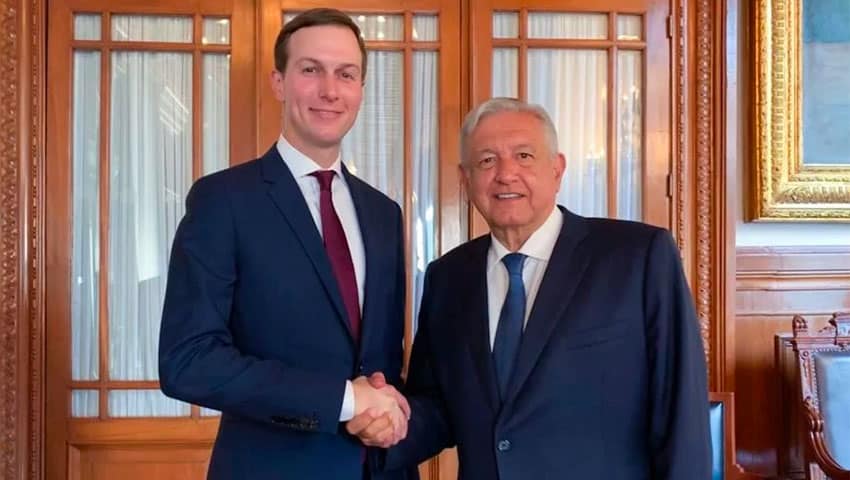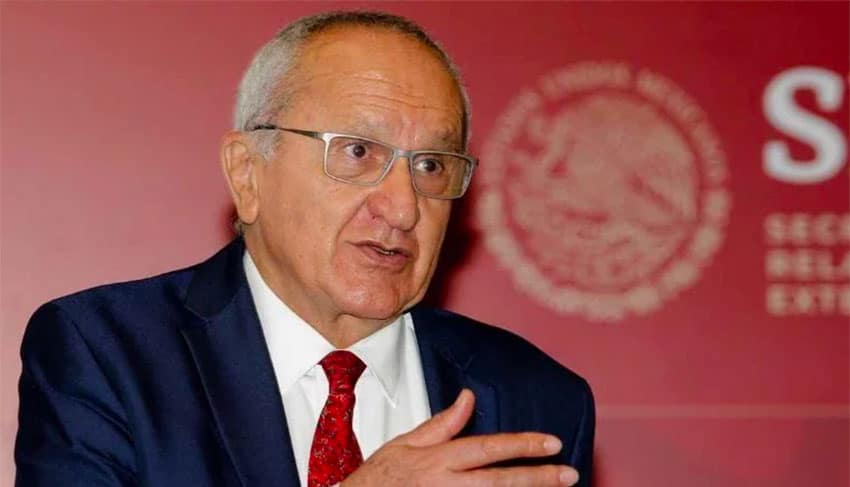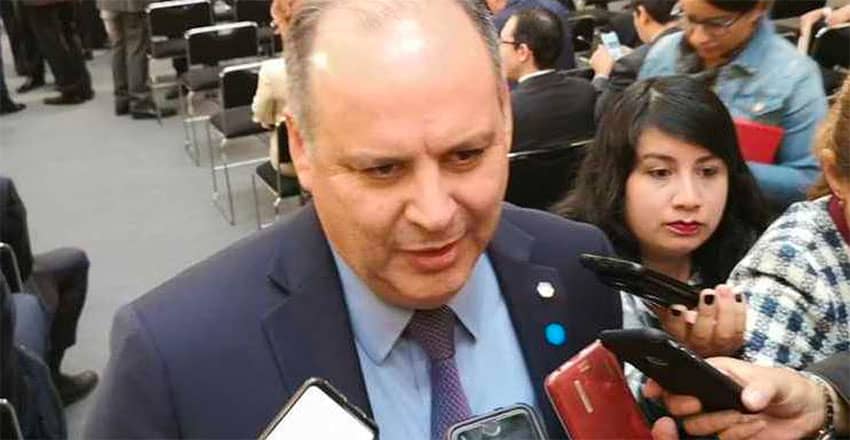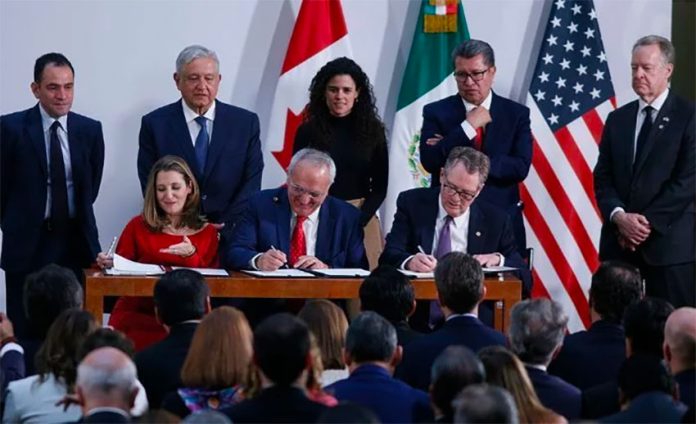Officials from Mexico, Canada and the United States signed a revised version of the new North American free trade agreement on Tuesday, paving the way for the trilateral pact to take effect in 2020.
Foreign affairs undersecretary Jesús Seade, Deputy Prime Minister of Canada Chrystia Freeland and U.S. Trade Representative Robert Lighthizer signed a protocol to modify the United States-Mexico-Canada Agreement (USMCA) at an event in the National Palace in Mexico City attended by President López Obrador and other officials.
The revamped trade pact stipulates that within seven years, 70% of steel used in automaking must be melted and poured in North America in order for vehicles to qualify for zero tariffs. The rule largely shuts the door on semi-finished metal from China and elsewhere. The same rule for aluminum was not included but the three countries agreed to reconsider the possibility in 10 years.
The amended agreement – which was not made public – also allows for independent experts to carry out inspections of workplaces in Mexico to verify their compliance with new labor laws that guarantee greater rights and freedoms for union members, according to the United States and Canada.
However, undersescretary Seade denied that foreign labor inspectors would work in Mexico and said that disputes between USMCA countries would be resolved through panels.

Among other modifications, the revised accord imposes stricter labor rules that aim to reduce Mexico’s low-wage advantage and loosens intellectual property rules for medications, which is expected to help keep prices down.
A ratification vote on the revised pact could take place in the United States House of Representatives by December 20 but Senate majority leader Mitch McConnell indicated that the upper house wasn’t likely to consider the agreement until early next year.
Ricardo Monreal, leader of the ruling Morena party in the Mexican Senate, said the revised deal will go to the upper house immediately, adding that debate will begin this week. Freeland said that no ratification timetable has been set in Canada but urged parliamentarians to pass it quickly, declaring that the deal was in Canada’s national interest.
Speaking after the signing ceremony, López Obrador described the updated pact as an “agreement of global dimension,” declaring that it will attract new investment to Mexico, stimulate economic growth, create jobs and reduce migration.
He thanked lawmakers in the United States as well as U.S. President Donald Trump.
“I’m obliged to acknowledge the respectful treatment we’ve received from President Donald Trump. Some people thought that reaching this agreement wasn’t going to be possible . . . that we weren’t going to understand each other, that we were going to fight, that we were going to butt heads, and look how things are,” he said.

For his part, Lighthizer described the pact as “the best trade agreement in history,” asserting that it will make all three countries richer.
“. . . We in the United States have a stake in Mexico being richer. It’s important for us that Mexico succeed and I think this agreement is going to make that more likely . . .” he said.
Lighthizer praised López Obrador for supporting the deal, whose original incarnation was negotiated before he took office.
“In the middle of this negotiation, you were running for election, you took the high road, the road that was best for North America and for Mexico, you never got involved in politics with respect to this. It was a very impressive thing for all of us to watch . . .” he said.
Later Tuesday, Mexican business leaders offered varying assessments of the modified pact.
Among those who expressed support were Mexican Business Council president Antonio del Valle and Business Coordinating Council chief Carlos Salazar.

“We’re very happy; I believe that this [agreement] is extremely important for our country, it provides certainty for large investments . . . That’s why we generally agree with everything that was signed,” Salazar said.
Mexican Employers Federation (Coparmex) president Gustavo de Hoyos took a very different view, charging that Mexico had ceded too much ground.
“We’re happy that the negotiation has finished. If it went on longer we could have ended up handing over the Isthmus of Tehuantepec . . . What’s been made clear is that this government is a bad negotiator, there is a clear step backward [for Mexico] from what we got in the close of negotiations on November 30 [2018],” he said.
“I believe that what happened here is [that Mexico adopted] a position akin to [former president Antonio López de] Santa Anna . . . Since half of Mexico’s territory was ceded in the [1848] Treaty of Guadalupe Hidalgo . . . history hasn’t recorded a government that ceded more,” de Hoyos added.
He questioned why López Obrador thanked Trump considering that the “new agreement was developed under threat from beginning to end” and said that the private sector was not consulted before the revised deal was signed.
“. . . They [the federal government] went far beyond the limits [of] . . . the country’s best interest . . . We hope that we don’t find any surprises in the fine print,” de Hoyos said.
In response, Foreign Secretary Marcelo Ebrard said that Coparmex’s position was indicative of an “ideological difference” with the government whose resolution will not be possible.
“. . . We think . . . that having a lax position [on labor issues] is bad for the economy. There is a difference there [with Coparmex] and of course they’re going to be against the matter being included in the agreement.”
Source: El Economista (sp), Milenio (sp), El Financiero (sp), Reuters (en)
